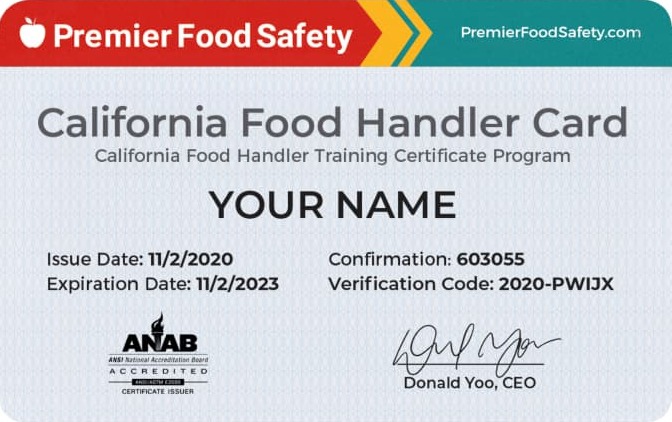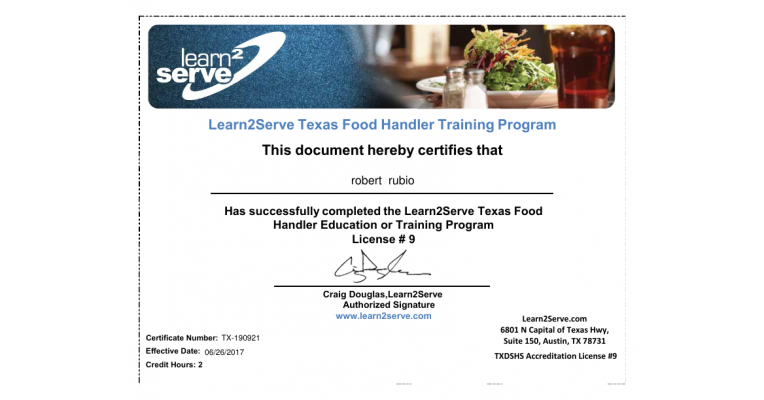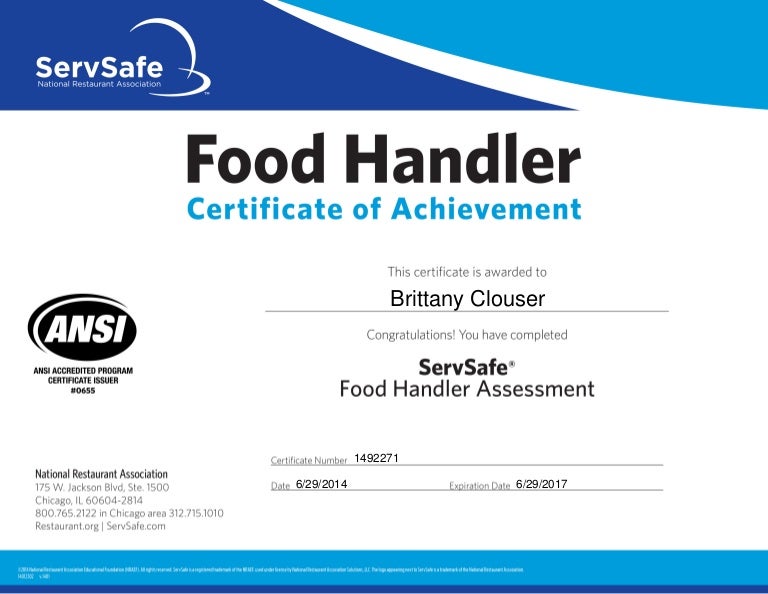Why Every Food Solution Worker Requirements a ServSafe Food Handler Certificate
Why Every Food Solution Worker Requirements a ServSafe Food Handler Certificate
Blog Article
Get Licensed: Master Food Safety And Security With Food Handler Certification
The relevance of obtaining a Food Handler Accreditation can not be overemphasized in today's food service landscape. This credential not just empowers individuals with essential understanding of health and safety and security techniques but likewise plays a crucial role in protecting public health and wellness. As the industry faces enhancing examination regarding food safety requirements, understanding the qualification process and its ramifications comes to be crucial. Yet, lots of may stay not aware of the thorough advantages that expand past compliance. What opportunities could arise for those that take this vital step towards mastery in food safety and security?

Importance of Food Safety And Security Accreditation
Food security certification is critical for making certain that food handlers are geared up with the expertise and abilities required to preserve high standards of health and security in cooking and solution. This accreditation not only boosts the competency of people functioning in the food industry yet likewise cultivates a culture of safety and security that benefits both consumers and workers.
By obtaining food safety and security accreditation, food trainers end up being knowledgeable about necessary practices such as appropriate food storage, cross-contamination prevention, and individual hygiene requirements. ServSafe Food Handler Certification. This understanding dramatically decreases the threat of foodborne diseases, which can have extreme health ramifications and influence public trust in food establishments. Certified food trainers are much better prepared to abide with national and regional guidelines, thereby reducing the threat of lawful responsibilities and penalties for food companies.
Furthermore, having actually accredited team can improve a facility's credibility, as customers significantly prioritize security in their eating experiences. Eventually, food security certification is not just a governing demand; it is a vital investment in the overall top quality and reliability of food service operations, cultivating depend on and guaranteeing that safety stays a leading concern in the market.

Introduction of Accreditation Process
Protecting food security certification entails an organized procedure designed to outfit food handlers with the essential understanding and skills. This procedure normally starts with picking an accredited training program, which can be supplied in various styles such as in-person courses, on-line training courses, or crossbreed alternatives. Participants need to choose a program that meets local regulatory needs and lines up with their learning choices.
Once enrolled, prospects take part in thorough training that covers important food security ideas and methods - ServSafe Food Handler Certification. This training usually consists of interactive components, real-world scenarios, and evaluations to reinforce understanding. After completing the coursework, individuals must pass a qualification exam that evaluates their understanding of food safety principles
Upon effectively removing the exam, people get their food handler accreditation, which is usually valid for a particular duration, typically ranging from one to three years. It is vital for qualified food handlers to remain upgraded with any changes in food safety guidelines and techniques, necessitating regular revival or proceeding education. This qualification procedure is essential for making certain that food handlers are knowledgeable regarding safe food managing methods, consequently lowering the risk of foodborne illnesses and advertising public health and wellness.
Key Subjects Covered in Training
A detailed food trainer training program generally covers numerous essential topics crucial for keeping food security and avoiding foodborne health problems. Recognizing the principles of food safety and security is foundational, including the importance of proper hygiene practices for food handlers. This consists of handwashing techniques, appropriate usage of gloves, and personal sanitation standards.
One more important area is the recognition and monitoring of food risks. Trainees find out about organic, chemical, and physical dangers, in addition to techniques for avoiding cross-contamination. Temperature control is likewise highlighted, as keeping proper food preparation and storage space temperature levels is important for preventing bacterial development.
The training program addresses safe food storage space techniques, outlining exactly how to appropriately label and arrange food products to ensure quality and safety and security. Furthermore, individuals are informed on cleansing and disinfecting treatments for tools and surface areas to eliminate potential impurities.

Benefits of Getting Licensed
Acquiring food handler qualification uses various benefits that extend past individual expertise and skills. It improves a go to this web-site person's understanding of secure food practices, which is critical in avoiding foodborne diseases. This knowledge not just safeguards the health of customers but likewise promotes a culture of food safety and security within the work environment.
Furthermore, certification demonstrates a commitment to professionalism and trust and duty. Employers frequently choose or require qualified staff members, recognizing that qualified individuals are more probable to comply with security protocols and regulations. This can result in boosted ergonomics and lowered liability for organizations, as experienced personnel are much better furnished to take care of food safely.
Additionally, obtaining certification can increase a person's self-confidence in their role within the food solution sector. This hop over to here confidence can convert into far better client service and fulfillment, as staff members that comprehend food security are extra most likely to connect successfully regarding cooking and handling.
Finally, several certification programs supply upgraded training and resources, making sure that licensed individuals continue to be educated regarding the most recent policies and best techniques, consequently strengthening their function as well-informed professionals in the food safety and security landscape.
Occupation Opportunities in Food Safety
The structure of food security expertise acquired via accreditation opens a range of career chances within the food industry. As food security laws end up being progressively rigid, services look for qualified experts to ensure compliance and keep high standards.
People with food handler accreditation can seek roles such as food security assessors, that evaluate centers for adherence to health policies, or food security supervisors, tasked with establishing and carrying out safety and security methods in food processing plants or restaurants. Furthermore, functions in quality control and control are available, where experts check manufacturing procedures to mitigate risks related to foodborne health problems.
Moreover, the expanding trend of food sustainability and organic products has created chances for food security experts that focus on encouraging firms on ideal practices. Those with a certification can also explore positions in education and learning and training, aiding to enlighten others regarding risk-free food managing methods.

Conclusion
Food trainer certification works as a vital element in boosting food security within the food solution industry. By acquiring this accreditation, individuals not only get vital expertise and skills however additionally contribute to the general health and safety of customers - ServSafe Food Handlers Card. The strenuous training ensures adherence to hygiene methods and danger management, ultimately promoting a more secure eating environment. As food safety continues to be a top priority, the certification opens doors to many job possibilities in this important area.
By getting food safety and security qualification, food trainers become familiar with important methods such as appropriate food storage space, cross-contamination prevention, and personal hygiene standards.Securing food try this web-site safety and security qualification entails an organized process developed to equip food handlers with the essential expertise and abilities. It is critical for qualified food trainers to stay updated with any kind of adjustments in food security guidelines and practices, necessitating periodic revival or proceeding education.An extensive food handler training program usually covers several vital subjects vital for preserving food safety and avoiding foodborne illnesses.Food trainer accreditation serves as an essential element in improving food safety and security within the food solution industry.
Report this page